Cos’è un sistema di filtrazione dell’acqua potabile?
4. Considerazione completa dei costi:Quando si sceglie asistema di filtrazione dell'acqua potabile, è necessario considerare in modo esaustivo il costo di acquisto iniziale, il costo di installazione e il costo di utilizzo a lungo termine e scegliere apparecchiature con prestazioni ad alto costo.Conclusione
Essendo uno strumento importante per garantire la sicurezza dell'acqua potabile, i sistemi di filtrazione dell'acqua potabile sono stati ampiamente utilizzati nelle case, negli uffici, nelle scuole, negli ospedali e in altri luoghi. Comprendendone i principi, i tipi e le applicazioni e selezionando e utilizzando razionalmente i sistemi di filtrazione dell'acqua potabile, è possibile migliorare efficacemente la qualità dell'acqua potabile e garantire la salute e la qualità della vita. Nella vita quotidiana, prestare attenzione ai test sulla qualità dell'acqua e alla manutenzione delle apparecchiature è la chiave per garantire il funzionamento efficace e a lungo termine dei sistemi di filtrazione dell'acqua potabile.
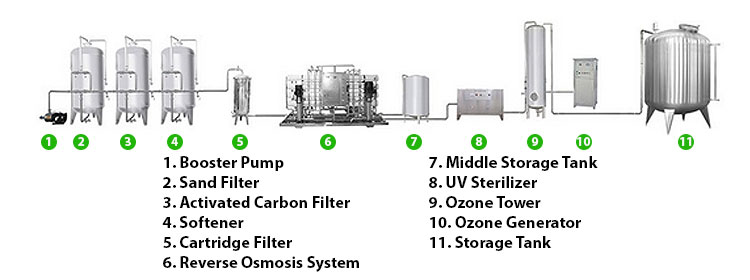
What is a drinking water filtration system?
A drinking water filtration system is a device used to purify tap water or other water sources. It removes impurities, bacteria, viruses, heavy metals and chemical pollutants in water through a variety of filtration technologies to provide safe and healthy drinking water. Common drinking water filtration systems include pre-filters, central water purifiers, water softeners, ultrafiltration machines and reverse osmosis water purifiers.
What is the working principle of a drinking water filtration system?
The drinking water filtration system purifies water quality through physical filtration, chemical adsorption and biological sterilization. The principles of several common filtration technologies: physical filtration, chemical adsorption, biological sterilization, reverse osmosis.
1. Physical filtration:
Physical filtration intercepts suspended particles, silt and large particles in water through a filter or filter membrane. Pre-filters usually use this technology as the first barrier of the water purification system to protect subsequent filtration units.
2. Chemical adsorption:
Chemical adsorption uses the porous structure of materials such as activated carbon to adsorb residual chlorine, odor, organic matter and some heavy metals in water. Activated carbon filter elements are typical representatives of chemical adsorption technology and are widely used in various water purifiers.
3. Biological sterilization:
Biological sterilization mainly kills bacteria, viruses and other microorganisms in water through ultraviolet rays or ozone. Ultraviolet disinfection uses UV-C light to destroy the DNA or RNA structure of microorganisms, and ozone generators eliminate pathogens through oxidation reactions.
4. Reverse osmosis:
Reverse osmosis (RO) technology separates dissolved solids, heavy metals, bacteria and viruses in water through a semi-permeable membrane. The RO membrane has an extremely small pore size and only allows water molecules to pass through. It is one of the most sophisticated filtration methods at present and is often used to provide high-purity drinking water.
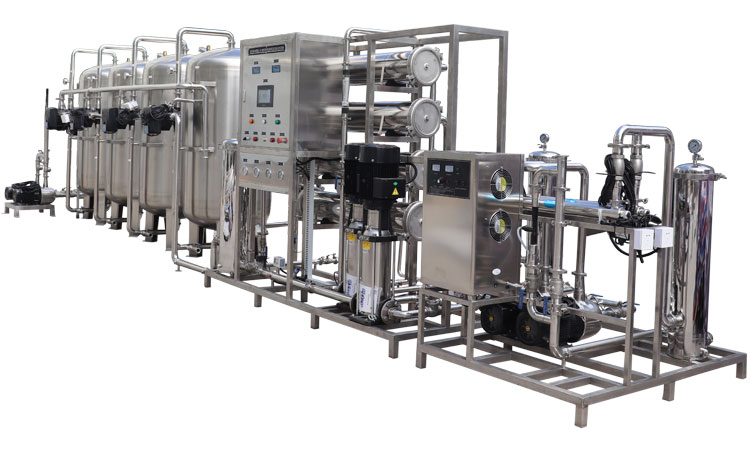
What are the main types of drinking water filtration systems?
The main types of drinking water filtration systems are: pre-filter, central water purifier, water softener, ultrafiltration machine, reverse osmosis water purifier.
1. Pre-filter:
The pre-filter is installed at the water pipe entering the house to remove large particles of impurities, silt and rust, etc., and protect the subsequent filtration equipment. The pre-filter has a simple structure and is easy to maintain. It is the basic part of the household water treatment system.
2. Central water purifier:
The central water purifier is installed on the main water pipe for the whole house. It combines a variety of filtration technologies to comprehensively purify the water used in the whole house. Central water purifiers usually include units such as sedimentation filtration, activated carbon filtration and ultraviolet disinfection, which are suitable for improving the overall water quality of the family.
3. Water softener:
The water softener removes calcium and magnesium ions from the water through ion exchange resin to prevent scale formation. The water softener is mainly used to protect household water heaters, washing machines, boilers and other equipment, extend their service life, and improve the quality of bathing water.
4. Ultrafiltration machine:
The ultrafiltration machine uses ultrafiltration membrane to filter suspended matter, colloids and microorganisms in the water to retain minerals in the water. Ultrafiltration technology has high precision, but it cannot remove dissolved solids and certain organic pollutants. It is suitable for occasions where water quality requirements are not too high.
5. Reverse Osmosis Water Purifier:
Reverse Osmosis Water Purifier uses RO membrane to remove dissolved solids, heavy metals, bacteria and viruses in water to provide high-purity drinking water. RO water purifiers are usually equipped with multiple filter cartridges, including pre-filters, activated carbon filters and RO membrane filters, and are high-end choices for home drinking water treatment.
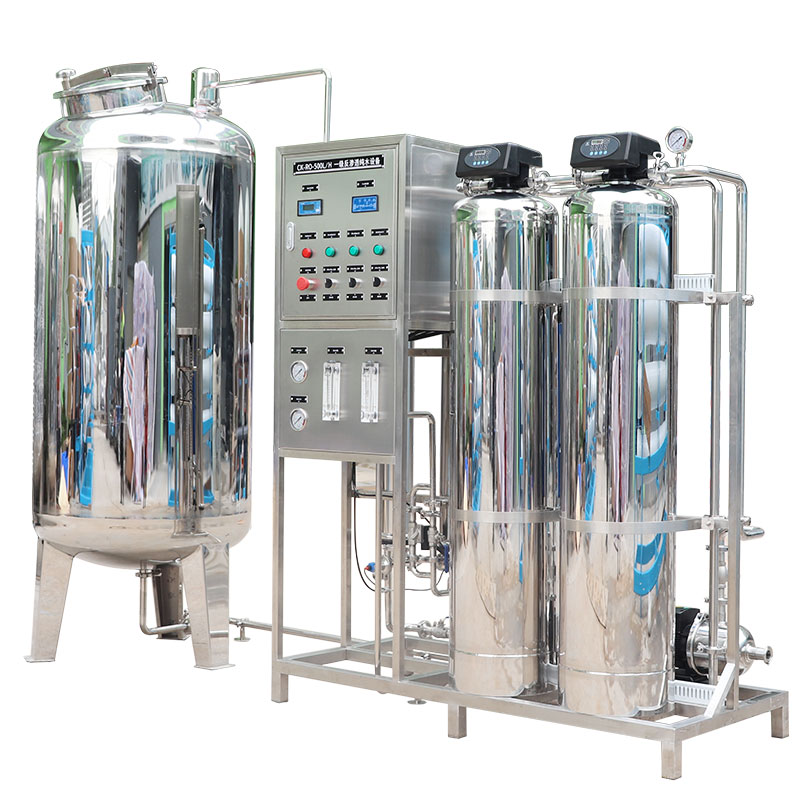
What are the application scenarios of drinking water filtration systems?
1. Home drinking water:
Home is the main application place for drinking water filtration systems. By installing pre-filters, central water purifiers or reverse osmosis water purifiers, clean and healthy drinking water and domestic water are provided. Different types of water purification equipment can be selected according to household water quality and water demand.
2. Offices and commercial places:
Offices and commercial places usually require large-capacity water purification equipment to meet the water needs of multiple people. Central water purifiers and RO water purifiers are common choices, which improve the health and satisfaction of employees and customers by providing high-quality drinking water.
3. Schools and hospitals:
Schools and hospitals have strict requirements on the quality of drinking water and need to ensure the safety and hygiene of water quality. Drinking water filtration systems can effectively remove bacteria, viruses and other contaminants in water to ensure the safety of water for teachers, students and patients.
4. Catering and food processing:
The catering and food processing industries have high requirements for water quality, which directly affects the taste and safety of food. By installing an efficient drinking water filtration system, the purity of processing water and drinking water for dining can be ensured, and product quality and safety can be improved.
What are the advantages and disadvantages of drinking water filtration systems?
1. Advantages of drinking water filtration systems:
● Health protection: The drinking water filtration system effectively removes bacteria, viruses, heavy metals and organic pollutants in water to provide safe and healthy drinking water.
● Improve taste: By removing residual chlorine and organic matter, the taste of water is improved, making drinking water sweeter and more delicious.
● Protect equipment: Equipment such as water softeners and pre-filters can extend the service life of household water equipment and reduce maintenance costs.
● Diverse choices: According to different water quality and water demand, different types of filtration equipment can be selected for flexible matching.
2. Disadvantages of drinking water filtration system:
● Installation cost: High-end drinking water filtration systems such as reverse osmosis water purifiers have high installation costs and require professional installation and maintenance.
● Filter element replacement: The filter element needs to be replaced regularly, which increases the maintenance cost and use cost.
● Wastewater generation: Reverse osmosis water purifiers will generate a certain amount of wastewater, which needs to be properly treated to avoid waste.
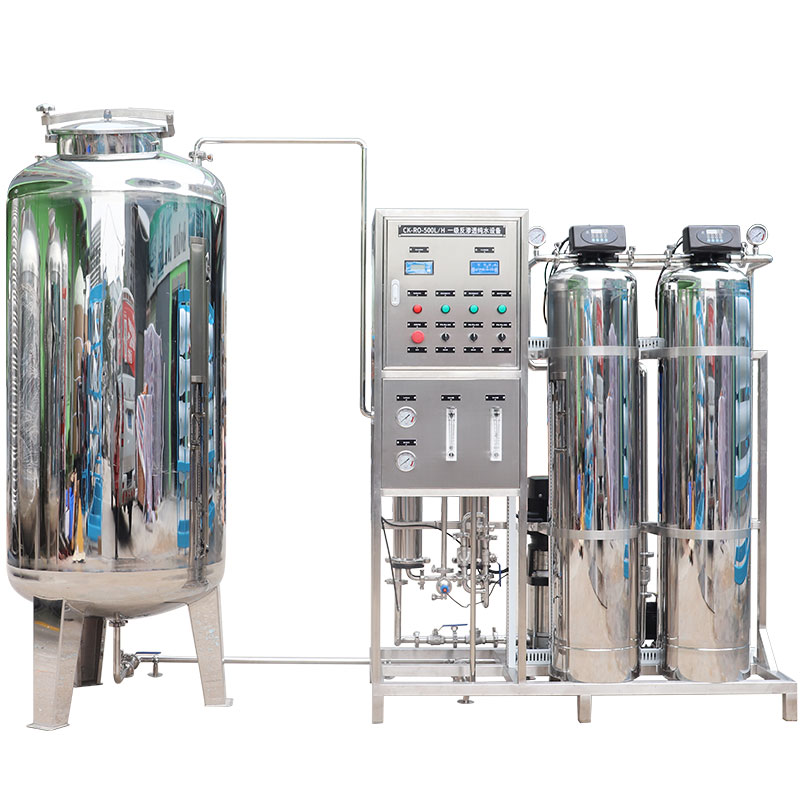
Precautions for choosing a drinking water filtration system
1. Water quality testing:
Before choosing a drinking water filtration system, water quality testing should be carried out to understand the types and contents of the main pollutants in the water so as to choose the appropriate filtration technology and equipment.
2. Equipment brand and quality:
Choose well-known brands and reliable quality equipment to ensure the filtration effect and service life. You can refer to user reviews and professional evaluations to purchase products with good reputation.
3. Installation and maintenance:
The installation of the drinking water filtration system must be carried out by professionals to ensure the normal operation of the equipment. Regularly replace the filter element and maintain the equipment to maintain the filtration effect.
4. Comprehensive cost consideration:
When choosing a drinking water filtration system, you should comprehensively consider the initial purchase cost, installation cost and long-term use cost, and choose equipment with high cost performance.
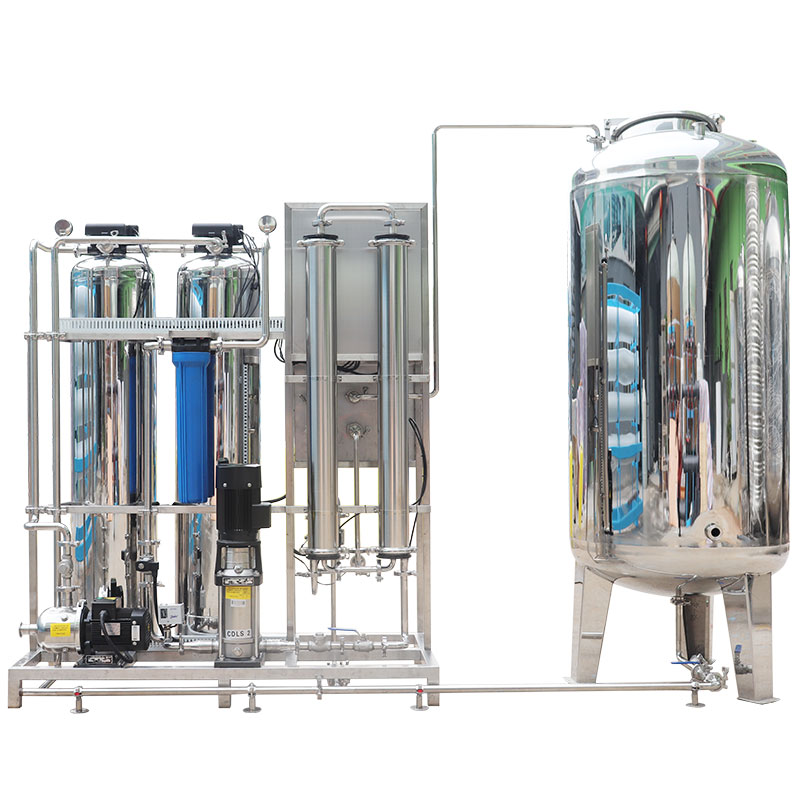
Conclusion
As an important tool to ensure the safety of drinking water, drinking water filtration systems have been widely used in homes, offices, schools, hospitals and other places. By understanding its principles, types and applications, and rationally selecting and using drinking water filtration systems, the quality of drinking water can be effectively improved, and health and quality of life can be guaranteed. In daily life, paying attention to water quality testing and equipment maintenance is the key to ensuring the long-term and effective operation of drinking water filtration systems.
L'installazione del sistema di filtrazione dell'acqua potabile deve essere eseguita da professionisti per garantire il normale funzionamento dell'apparecchiatura. Sostituire regolarmente l'elemento filtrante e sottoporre a manutenzione l'attrezzatura per mantenere l'effetto di filtrazione.





